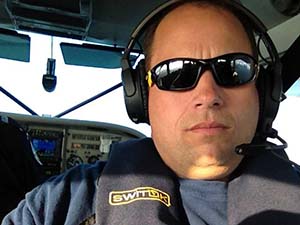Volunteer Spotlight:

Jeremy Talbott, member of the council’s Port Operations and Vessel Traffic System Committee, is enthusiastic about his new hometown. He moved to Valdez with his wife Keri and their two daughters in May of 2014 to become the new harbormaster for the city.
“I didn’t even know where Valdez was,” Talbot said. “But it was in Alaska.”
Talbott had dreamed of moving to Alaska for a while. He applied for the Homer Harbormasters job several years ago, and later almost got a position in Juneau as Harbormaster. Talbott was disappointed, but Juneau’s port director told him about the opening in Valdez.
“In hindsight, I’m really glad I got Valdez instead of Juneau,” he says. “I love it. I hit the lottery.”
Another reason Talbott was excited about getting the position in Valdez was there is a brand new harbor in the works.
“Where I come from, people don’t build harbors anymore, they’re already built.”
A young pirate explores the San Juan Islands
Talbott loves being on the water. He was born and raised in Washington State, and spent summers with his grandfather in the San Juan Islands.
“My grandpa and I built a boat when I was ten.”
He spent summers cruising around the islands, fishing from his 14 foot boat with a 20 horse power engine.
“I was in the San Juan Islands with my tent and my stove. I ran crab traps and I sold my crab to the tourists. I was pretty much a pirate. As long as I checked in at sunset on the VHF with my grandpa to let him know everything was going OK, I could stay out,” Talbott says. “If I didn’t check in he’d get in his boat and come looking for me.”
“It was pretty amazing to grow up out there in that environment and to have that amount of trust. If my parents knew what was happening, they would have flipped out.”
Interest in emergency response started early
As a teenager, Talbott spent time with his dad, who worked in wilderness rescue.
“We were out rescuing lost hunters in the Cascade Mountains in Washington State. I got that bug early.”
Those early experiences led him to study emergency response. With his grandfather’s encouragement, after high school he left the Pacific Northwest to attend the University of Alabama, where he earned a paramedic certificate.
After school, Talbott moved back home. There were no full time positions he was qualified for, so he went to work, helping his dad start a septic company. Meanwhile, he volunteered with the fire department.
“I’ve always looked for work in public service. Community service is really important to me.”
Talbott later attended the law enforcement academy, however budget cuts meant his position was cut. He ended up finding his place as the assistant harbormaster for Friday Harbor in the San Juan Islands. He stayed there for ten years before his move to Alaska.
He worked on a flight medical evacuation team in the evenings, and found time to volunteer with the Island Oil Spill Association, a nonprofit organization that responds to oil spills in the San Juan Islands.
“The Puget Sound has no idea. They don’t get it. After living up here for 18 months and seeing what we have here,” Talbott continues, “they don’t have the containment or anything set up with the fishermen like SERVS does.”
“It makes me sad because the San Juan Islands is just like Prince William Sound in that it’s a special place.”
Participation in drills and exercises
With his background in emergency medicine and the fire department, Talbott helped coordinate a lot of drills and exercises for the region.
“I’d invite everybody in to play on our large scale exercises,” Talbott said. The Coast Guard, fire department, the state ferry, and law enforcement all participated.
“We had 150-250 people partake in those each time. We would do a large scale exercise and then do a tabletop exercise the following year.”
The group practiced responding to fuel spills, terrorist attacks, ferry accidents. They deployed oil spill boom and practiced evacuations.
“We’d do the drill and then come back and critique it,” Talbott said.
He says the drills and exercises were helpful when a real event happened.
“Everybody knew what to do. Everybody knew where to meet and things went smoothly. The representatives were all the people that were in the drills. It works out nice when you practice.”
San Juan Islands versus Prince William Sound
During his training for oil spill response in Washington State, the instructors used photos of the Exxon Valdez disaster to show students the consequences of not being prepared. Now that he’s been in Valdez for a while, he says the thought of a spill the size of the Exxon Valdez is frightening.
“In hindsight, those trainers don’t have any idea what it’s like. Actually living here for 18 months, I’m starting to understand the magnitude.”
“I didn’t live through the spill and I wasn’t in Alaska during the spill. It’s absolutely beautiful out there. And I know if you dig down in some places you can still find the oil, but at least on the top it looks pretty pristine to me.”
- Jeremy Talbott is a member of the council’s Port Operations and Vessel Traffic System Committee. The committee supports the council’s mission by monitoring port and tanker operations and the vessel escort system in Prince William Sound, and by identifying and recommending improvements